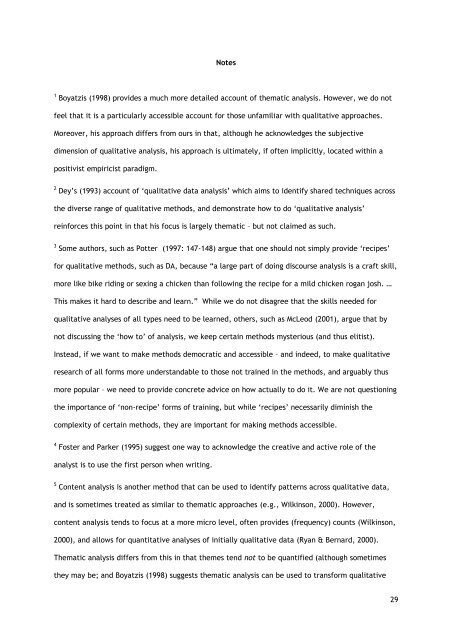Braun, V. and Clarke, V. - UWE Research Repository - University of ...
Braun, V. and Clarke, V. - UWE Research Repository - University of ...
Braun, V. and Clarke, V. - UWE Research Repository - University of ...
Create successful ePaper yourself
Turn your PDF publications into a flip-book with our unique Google optimized e-Paper software.
Notes<br />
1 Boyatzis (1998) provides a much more detailed account <strong>of</strong> thematic analysis. However, we do not<br />
feel that it is a particularly accessible account for those unfamiliar with qualitative approaches.<br />
Moreover, his approach differs from ours in that, although he acknowledges the subjective<br />
dimension <strong>of</strong> qualitative analysis, his approach is ultimately, if <strong>of</strong>ten implicitly, located within a<br />
positivist empiricist paradigm.<br />
2 Dey‟s (1993) account <strong>of</strong> „qualitative data analysis‟ which aims to identify shared techniques across<br />
the diverse range <strong>of</strong> qualitative methods, <strong>and</strong> demonstrate how to do „qualitative analysis‟<br />
reinforces this point in that his focus is largely thematic – but not claimed as such.<br />
3 Some authors, such as Potter (1997: 147-148) argue that one should not simply provide „recipes‟<br />
for qualitative methods, such as DA, because “a large part <strong>of</strong> doing discourse analysis is a craft skill,<br />
more like bike riding or sexing a chicken than following the recipe for a mild chicken rogan josh. …<br />
This makes it hard to describe <strong>and</strong> learn.” While we do not disagree that the skills needed for<br />
qualitative analyses <strong>of</strong> all types need to be learned, others, such as McLeod (2001), argue that by<br />
not discussing the „how to‟ <strong>of</strong> analysis, we keep certain methods mysterious (<strong>and</strong> thus elitist).<br />
Instead, if we want to make methods democratic <strong>and</strong> accessible – <strong>and</strong> indeed, to make qualitative<br />
research <strong>of</strong> all forms more underst<strong>and</strong>able to those not trained in the methods, <strong>and</strong> arguably thus<br />
more popular – we need to provide concrete advice on how actually to do it. We are not questioning<br />
the importance <strong>of</strong> „non-recipe‟ forms <strong>of</strong> training, but while „recipes‟ necessarily diminish the<br />
complexity <strong>of</strong> certain methods, they are important for making methods accessible.<br />
4 Foster <strong>and</strong> Parker (1995) suggest one way to acknowledge the creative <strong>and</strong> active role <strong>of</strong> the<br />
analyst is to use the first person when writing.<br />
5 Content analysis is another method that can be used to identify patterns across qualitative data,<br />
<strong>and</strong> is sometimes treated as similar to thematic approaches (e.g., Wilkinson, 2000). However,<br />
content analysis tends to focus at a more micro level, <strong>of</strong>ten provides (frequency) counts (Wilkinson,<br />
2000), <strong>and</strong> allows for quantitative analyses <strong>of</strong> initially qualitative data (Ryan & Bernard, 2000).<br />
Thematic analysis differs from this in that themes tend not to be quantified (although sometimes<br />
they may be; <strong>and</strong> Boyatzis (1998) suggests thematic analysis can be used to transform qualitative<br />
29

















